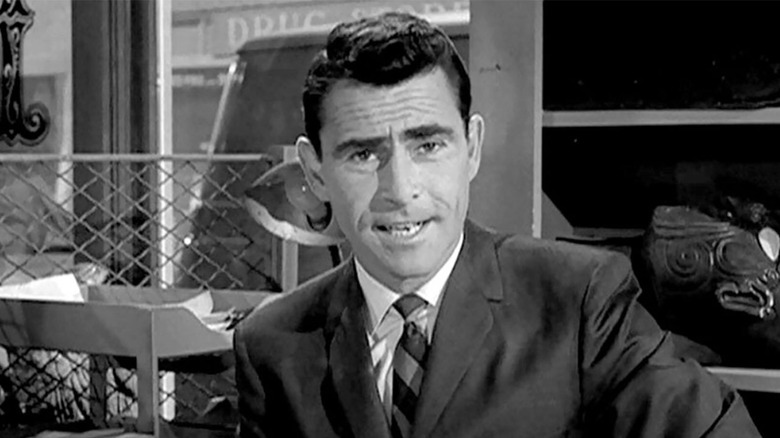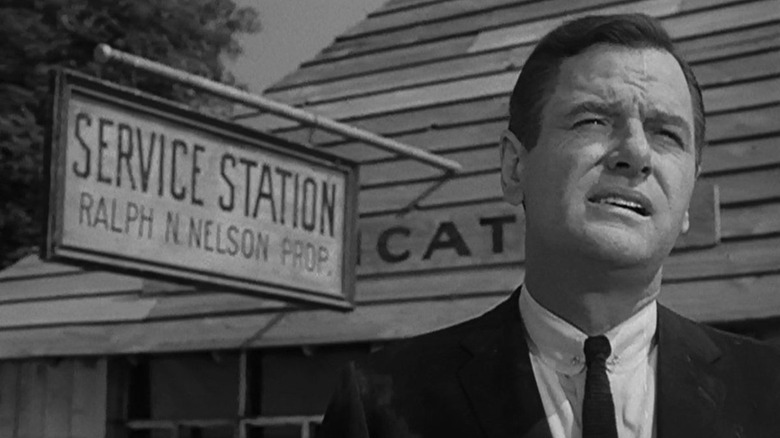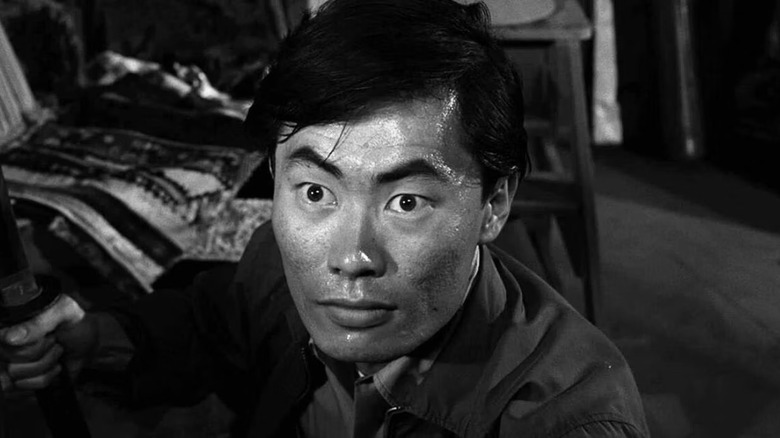Why Rod Serling Hated Seeing Reruns Of The Twilight Zone On TV
There are a lot of good things that have come about because of television syndication. It's helped shows find their footing and new audiences, and even helped other shows get created. After all, without the success of the original series of "Star Trek" in syndication, "Star Trek: The Next Generation" might have never happened. Essentially, syndication is when a television producer sells the rights to a show's reruns to other networks or channels, which is how "The Fresh Prince of Bel Air" magically seems to be on TV at almost every time of the day. Most of the time, shows selected for syndication are ones that don't require seeing several other episodes to understand, as they're often shown out of order (and sometimes seemingly at random). That means sitcoms work best, but game shows and anthology series also work pretty well.
Because of its self-contained anthology nature, "The Twilight Zone" seemed tailor-made for syndication. After all, each episode is its own self-contained story, and catching them at random is sort of fun because it's like a surprise grab bag of television goodness. So why did "The Twilight Zone" creator Rod Serling hate seeing the series in syndication, where it could find new viewers? It all comes down to syndication editing, which could happen for a variety of reasons.
Why Serling hated seeing reruns of The Twilight Zone
In the book "The Twilight Zone Companion" by Marc Scott Zicree, Serling's wife Carol revealed that he sold the rights to CBS shortly after the series went off the air because the network claimed they would never recoup the costs of the series, which "often went over budget." She points out that because of syndication, CBS ended up recouping the costs "many, many times" — and if Serling had held onto his rights, he presumably would have shared in that eventual monetary windfall. But the bigger reason Serling hated seeing the show in syndication was there were often significant cuts made that could sometimes make the story impossible to understand. Sometimes the cuts were because of content, but more often they were done in order to add in more commercial time, as the number of commercial breaks increased over the years. When Serling saw the season 1 episode "Walking Distance" on a local TV station, he said:
"You wouldn't recognize what series it was. Full scenes were deleted. It looked like a long, protracted commercial separated by fragmentary moments of indistinct drama."
Serling's frustration was understandable, as local stations would often cut the shows for time themselves, which means there are a multitude of different versions of "The Twilight Zone" episodes out there. Sadly, it looks like history will repeat itself as new media slowly adopts old media models again and streamers start looking to air their shows in syndication, as many of those shows weren't cut for commercials. Sure, it'll be nice for new audiences to have a chance to see certain series, but it comes at the loss of potentially important scenes.
An entire missing episode
While there were chunks cut from a number of "The Twilight Zone" episodes, in one instance, an entire episode was cut from re-broadcast. The episode in question, "The Encounter," was out of circulation for decades; it was controversial because of its stereotypically negative depiction of its Japanese character, played by a pre-"Star Trek" George Takei. It's a messy episode that is by no means one of the best from the series, but its removal from syndication brings up questions about how this kind of censorship can be genuinely harmful. In order to avoid repeating the mistakes of the past, we have to understand them, and hiding them from sight entirely doesn't help. Instead, we should reckon with our pasts, airing potentially sensitive episodes with a message about why it's wrong and how things have changed (and maybe need to change further).
Though Serling understandably hated syndication, that is how many fans found "The Twilight Zone." After all, the series aired from 1959 to 1964, when many of us weren't even born yet. Even if the syndicated versions are edited and don't work as well, they're still an introduction to the series that hopefully leads to the viewer seeking out more. The episodes are now intact on streaming and physical media, so those who enjoyed the syndicated taste can get the whole meal if they just know where to look.


